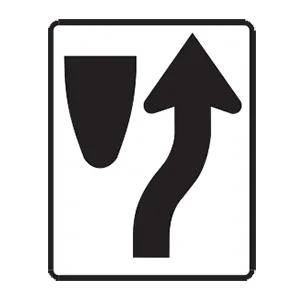FREE! Motorcycle Permit: Test Practice Online | NJ 2024 Page 5 of 7
Take advantage of this FREE motorcycle permit test practice held in NJ in 2021 to check your knowledge of the road rules. To improve your results, download a motorcycle manual book online, study theory, and train for free on our website. Note that motorcycle license requirements in New Jersey 2021 may vary from those in other states. Check our website for more sample tests, train as much as possible, and boost your grades!
29 . When crossing angled railroad tracks, it is usually safest to approach the tracks:
In general, it is safest to simply proceed straight in your lane when crossing angled railroad tracks. Turning to approach tracks at a right angle can be dangerous because it may send you traveling into another lane.
30 . A larger cushion of space may not be necessary if:
Your following distance should be larger than usual when you are traveling under imperfect conditions. Increase your following distance if pavement is slippery, you can't see through the vehicle in front of you, or traffic is heavy.
31 . A DOT-compliant helmet has all of the following, except:
Any U.S. Department of Transportation-compliant helmet is required to have an impact-resistant outer shell, an impact-absorbing inner liner, a comfort liner, and a chinstrap retention system.
32 . This sign means:

Regulation signs regulate traffic speed and movement, displaying rules which drivers must obey. This regulation sign indicates that drivers should keep right to avoid an upcoming potential driving hazard.
33 . When approaching a blind intersection, you should:
When approaching a blind intersection, move into the part of the lane that will bring you into an oncoming driver's field of vision at the earliest possible moment. For example, when approaching a blind corner to your right, you may be seen sooner if you are in the left portion of your lane and not in the center portion.
34 . When approaching an object or uneven surface that you cannot avoid, you should:
If you cannot avoid riding over an obstacle or uneven surface, you should approach it at as close to a 90-degree angle as possible. Slow down as much as you can, make sure that your motorcycle is upright, and rise slightly off your seat so your knees can absorb some of the force of impact. Just before contact, roll on the throttle slightly to lighten the front end.
35 . After drinking, what lessens the effects of alcohol?
The liver burns alcohol at a set rate, and there is nothing you can do to speed along the process. The only way to lessen the effects of alcohol is to give your body the time needed to remove it.
See the exact questions that will be on the 2024 New Jersey DMV exam.
99.2% of people who use the cheat sheet pass the FIRST TIME
Jeneen was tired of paying $5/gallon. She got herself a scooter that required the motorcycle license. She studyed the motorcycle test cheat sheet and passed her test the next day!
Christopher tells us how he knew nothing prior to obtaining the motorcycle study guide, and he only got one question wrong because he clicked on the wrong answer by mistake.



